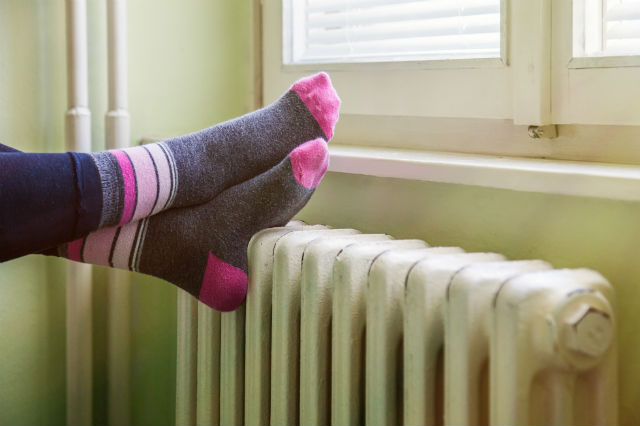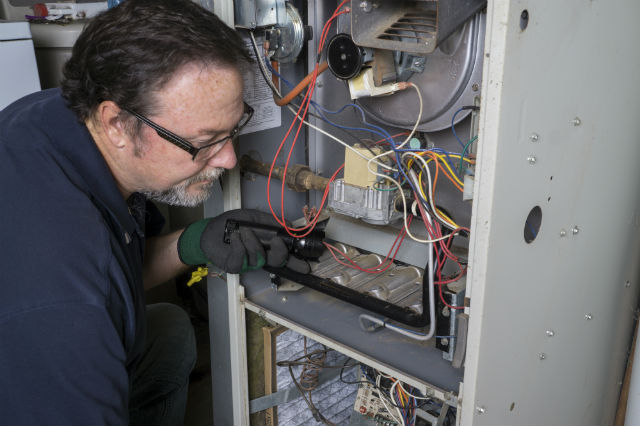If you have an aging heating system that doesn’t perform as well as it used to, it might be a good idea to consider your options. But when should you replace your heating system, and when is it best to repair it? This quick guide will point you in the right direction.
Different Heating Systems
First, it’s important to know which fuel you use to heat your home.While gas heating systems are more efficient than oil, they’re usually at least 10-15% more expensive than oil heating systems. That being said, gas fuels costs are usually less than oil, so you’ll typically be saving more money in the long run. Still, to have a gas heating system, your house needs to be in an area where a gas supply is readily available.
Geothermal technology is another promising option for heating your home. These innovative systems use minimal energy to warm your home by directly using the earth’s heat. Although it’s typically a lot more expensive to install, it has the lowest operating cost out of any of the three options. But as oil and gas are by far the most common, we’ll concentrate on those two kinds of heating systems.
When You Should Replace Your Heating System. And When You Should Repair It.
Generally, it’s best to repair your heating system if it’s relatively new (under 12 years old.) If it’s been part of your home for 15 years or more, it’s likely not working as efficiently as you’d like, so it might be wise to invest in a replacement.
In the same way, if you notice minor issues like leaking water or an inaccurate thermostat reading, a repair makes sense; on the other hand, if the heat exchanger is damaged, you could be setting your family at risk of a carbon monoxide leak, so replacing your heating system is the better choice.
It’s also important to not neglect the financial aspect: if your repairs are so extensive that they’re going to cost you more than half of what a new heating system would cost, it just makes more sense to have a new unit installed.
Finally, if you notice that your house is heating unevenly, it might be an issue with your heating system. More likely, it may be an issue with your air duct system. Be sure to call your HVAC specialist for an evaluation and see what’s causing the issue. If the heating system is the culprit, a replacement is probably in order.

What to Look for When Evaluating Your Heating System
Fuel efficiency is essential when evaluating your heating system. If it’s an older model, it’s likely not up to the same standards as today. You’ll want to determine the model’s Annual Fuel Utilization Efficiency score and compare your options. If your heating system has an AFUE rating lower than 56%, it’s better for the environment and your wallet to get a new heating system installed. While a higher efficiency model may cost you a bit more for the initial purchase, over the lifetime of the heating system you’ll be paying a lot less on your bill.
With a gas system, you can also observe the color of the flame to give you a hint how well your heating system is working. If the flame is blue with just a slight appearance of orange or yellow, this is a sign that your heating system is working as it should. If the flame is totally yellow, this can be a major warning sign that your heating system is giving off carbon monoxide, so make sure it’s checked out by a professional as soon as possible!
Aside from the fuel efficiency and flame color, there are a few other signs that your heating system needs a checkup. If it’s expelling dusty or dry air or giving off strange smells, if you noticed a marked increase in your bill, or if you hear any strange noises coming from your heating system (like popping or banging), contact a professional for assistance.
Replacing Your Heating System: Things to Look for in a New Model
One of the most essential factors to be aware of when buying a new heating system is the unit size. It needs to be sized according to your home’s heating needs; otherwise, you might not see the results you hope for. An HVAC professional can determine the best size to adequately heat your home.
You’ll also want to do a bit of research and make sure the model you are buying is reliable. You don’t want to purchase a cheap or poorly reviewed heating system, only to find that you need repairs done every other month. Be sure to check your chosen model’s AFUE rating as well.
Finally, make sure you factor in your maintenance costs. If you’re buying an oil heating system, you’re going to need regular maintenance on the unit to keep it running efficiently. On the other hand, a gas heating system won’t need as much maintenance beyond any unexpected repairs.
When You Can DIY and When to Call a Pro
For some simple repairs, you can skip calling an HVAC professional and just make the fix yourself. For example, a clogged filter causing poor airflow is a common repair issue; simply replace the filter and you’re good to go. If your thermostat doesn’t seem to be reading properly, check for any loose wires or change the batteries. If you still notice the thermostat doesn’t work, have it evaluated by a specialist.
In the same way, if you think your heat exchanger is damaged or you notice another serious issue with your heating system, don’t try to fix it yourself. Repairing or maintaining your heating system is a lot riskier than many jobs around the house, so you always want to err on the side of safety and consult a professional.
AAA members receive exclusive savings on Petro home services. Learn more.
2 Thoughts on “When Should You Replace Your Heating System?”
Leave A Comment
Comments are subject to moderation and may or may not be published at the editor’s discretion. Only comments that are relevant to the article and add value to the Your AAA community will be considered. Comments may be edited for clarity and length.

















Good articles on heating system choices.
Hi Donaldl9,
Thank you for your feedback! If you enjoyed our article please share it, your friends may find it useful as well! Thanks again, MM